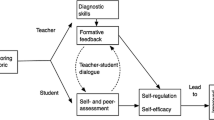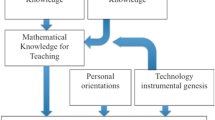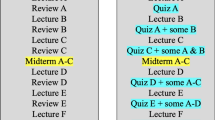Abstract
This article deals with what it means to possess competence in mathematics. It takes its point of departure in the fact that the notions of mathematical competence and mathematical competencies have gained a foothold as well as momentum in mathematics education research, development and practice throughout the last two decades. The Danish so-called KOM Project (KOM: Competencies and the Learning of Mathematics), the report from which was published in 2002, has played an instrumental role in that development. Since then, a host of new developments has taken place, and we—as the authors of the original report—have felt the need to take stock of this development and revisit the conceptualisation of the basic notions in order to provide an updated version of the original conceptual framework and terminology. Whilst the fundamentals of this framework have been preserved in this article, the version presented here in addition to an up-to-date terminology offers greater clarity and sharpness and richer explanations than found in the original.



Similar content being viewed by others
Notes
The original definition listed a number of ingredients in the notion of mathematical competence and read (Niss & Højgaard, 2011, p. 49): “Mathematical competence comprises having knowledge of, understanding, doing, using and having an opinion about mathematics and mathematical activity in a variety of contexts where mathematics plays or can play a role”.
The explicit emphasis on “engaging in mathematical inquiry” is a change from the original version.
The characterisation of this competency has been changed from the original version, which included both pure and applied mathematical problem handling, thus blurring the delineation between this competency and the modelling competency. In its present version, the problem handling competency deals with intra-mathematical problems only. Another change from the original version is the inclusion of an emphasis on the strategic aspects of problem solving.
In comparison with the original characterisation of this competency, which primarily focused on different forms of reasoning, the present one puts an added emphasis on reasoning as justification in the forefront of the description.
References
Abrantes, P. (2001). Mathematical competence for all: Options, implications and obstacles. Educational Studies in Mathematics, 47(2), 125–143.
Alpers, B., et al. (2013) A framework for mathematics curricula in engineering education. Brussels: European Society for Engineering Education (SEFI).
Blomhøj, M., & Jensen, T. H. (2003). Developing mathematical modelling competence: Conceptual clarification and educational planning. Teaching Mathematics and its Applications, 22, 123–139.
Blomhøj, M., & Jensen, T. H. (2007). What’s all the fuss about competencies? Experiences with using a competence perspective on mathematics education to develop the teaching of mathematical modelling. In W. Blum, P. L. Galbraith, H. W. Henn, & M. Niss (Eds.) , Modelling and applications in mathematics education: The 14th ICMI study (pp. 45–56). New York: Springer.
Blum, W., & Leiß, D. (2007). How do students and teachers deal with modelling problems? In C. Haines, P. Galbraith, W. Blum, & S. Khan (Eds.) , Mathematical Modelling (ICTMA 12): Education, engineering and economics (pp. 222–231). Chichester: Horwood.
Boesen, J., Helenius, O., Bergqvist, E., Bergqvist, T., Lithner, J., Palm, T., & Palmberg, B. (2014). Developing mathematical competence: From the intended to the enacted curriculum. The Journal of Mathematical Behavior, 33(3), 72–87.
Catalonian Department of Education. (2013) A competency based curriculum for primary education: Overview. Catalonia: Catalonian Department of Education.
D’Amore, B., Godino, J., & Fandińo, M. I. (2008) Competencias y matemátika. Bogotá: Magisterio.
Freudenthal, H. (1973) Mathematics as an educational task. Dordrecht: Kluwer Academic Publishers.
García, B., Coronado, A., Montealegra, L., Goraldo, A., Tovar, B., Morales, D., & Cortés, D. (2013) Competencias matématicas y actividad matemática de aprendizaje. Florencia: Universidad de la Amazonia.
Gregersen, F., Elf, N. F., Lassen, S., Laursen, H. P., Lørring, L., Mortensen, F. H., & Voigt, K. (2003) Fremtidens danskfag—en diskussion af danskfaglighed og et bud på dens fremtid [The future of the subject Danish—a discussion of the characteristics of Danish as a subject now and in the future]. Copenhagen: The Ministry of Education.
Højgaard, T. (2009). Competencies, skills and assessment. In R. Hunter, B. Bicknell, & T. Burgess (Eds.) , Crossing divides: Conference proceedings from MERGA 32 (pp. 225–231). Wellington: MERGA.
Højgaard, T (2010). Communication: The essential difference between mathematical modeling and problem solving. In R. Lesh, P. L. Galbraith, C. R. Haines, & A. Hurford (Eds.) , Modeling students’ mathematical modeling competencies (pp. 255–264). New York: Springer.
Højgaard, T. (2012). Competencies and the fighting of syllabusitis. In ICME 12 LOC (Ed.) , Pre-Proceedings of ICME 12 (pp. 6412–6420). Seoul: ICME 12 LOC. Available from the authors homepage.
Højgaard, T., Bundsgaard, J., Elmose, S., & Sølberg, J. (2010). Kompetencemål i praksis—foranalysen bag projektet KOMPIS [Competency objectives in practice—the pre-analysis for the project KOMPIS]. MONA, 3, 7–29.
Ishøj Kommune. (2017) “Flere Lille og Store Nørder i Ishøj”. evaluering 2017. offentlig version [“More Small and Big Nerds in Ishøj”. Assessment 2017. Public version]. Ishøj: Municipality of Ishøj.
Jaworski, B. (2012). Mathematical competence framework: An aid to identifying understanding? In C. Smith (Ed.) , Proceedings of the British society for research into learning mathematics (Vol. 32, pp. 103–109) Cambridge: University of Cambridge.
Jensen, T. H. (2007). Assessing mathematical modelling competency. In C. Haines, P. Galbraith, W. Blum, & S. Khan (Eds.) , Mathematical Modelling (ICTMA 12): Education, engineering and economics (pp. 141–148). Chichester: Horwood.
Köller, O., & Reiss, K. (2013). Mathematische Kompetenz messen. Gibt es Unterschiede zwischen standard-basierten Verfahren und diagnostiche Tests? In M. Hasselhorn, A. Heinze, W. Schneider, & U. Trautwein (Eds.) , Diagnostik mathematischer kompetenzen (pp. 25–40). Göttingen: Hogrefe.
Leuders, T. (2014). Modellierung mathematischer Kompetenzen—Kriterien für eine Validitätsprüfung aus fachdidaktischer Sicht. Journal für Mathematik-Didaktik, 35(1), 7–48.
Lithner, J., Bergqvist, E., Bergqvist, T., & Boesen, J. (2010). Mathematical competencies: A research framework. In C. Bergsten, E. Jablonka, & T. Wedege (Eds.) , Mathematics and mathematics education. cultural and social dimensions (pp. 157–167). Linköping: Svensk förening för matematikdidaktisk forskning (SMDF).
Montaigne, M. E. (1958) The complete essays of Montaigne. California: Stanford University Press. French original 1580.
National Research Council. (2001) Adding it up: Helping children learn mathematics. Washington DC: Mathematics Learning Study Committee (editors: J. Kilpatrick, J. Swafford & B. Findell), Center for Education, Division of Behavioral and Social Sciences and Education, National Academy Press.
Niss, M. (1999). Kompetencer og uddannelsesbeskrivelse [Competencies and subject description]. Uddannelse, 9, 21–29.
Niss, M. (2001). University Mathematics Based on Problem-Oriented Student Projects: 25 Years of Experience with the Roskilde Model. In D. Holton (Ed.) , The teaching and learning of mathematics at University Level: An ICMI study (pp. 153–165). Dordrecht: Kluwer Academic Publishers.
Niss, M. (2003). Applications of mathematics ‘2000’. In D. Coray, F. Furinghetti, H. Gispert, B. R. Hodgson, & G. Schubring (Eds.) , Moments of mathematics education in the Twentieth Century. Proceedings of the EM-ICMI Symposium, Geneva, 20–22 October 2000 (pp. 273–284). Genéva: L’Enseignement Mathématique.
Niss, M. (2003). Mathematical competencies and the learning of mathematics: The Danish KOM project. In A. Gagatsis, & S. Papastavridis (Eds.) , 3rd Mediterranean conference on mathematical education (pp. 115–124). Athens: Hellenic Mathematical Society and Cyprus Mathematical Society.
Niss, M. (2010). Modelling a crucial aspect of students’ mathematical modeling. In R. Lesh, P. L. Galbraith, C. R. Haines, & A. Hurford (Eds.) , Modeling students’ mathematical modeling competencies (pp. 43–59). New York: Springer.
Niss, M. (2015). Mathematical competencies and PISA. In K. Stacey, & R. Turner (Eds.) , Assessing mathematical literacy: The PISA experience (pp. 35–56). New York: Springer.
Niss, M., Bruder, R., Planas, N., Turner, R., & Villa-Ochoa, J. A. (2016). Survey team on: Conceptualisation of the role of competencies, knowing and knowledge in mathematics education research. ZDM, 48(5), 611–632.
Niss, M., Bruder, R., Planas, N., Turner, R., & Villa-Ochoa, J. A. (2017). Conceptualisation of the role of competencies, knowing and knowledge in mathematics education research. In G. Kaiser (Ed.) , Proceedings of the 13th International Congress on Mathematical Education (pp. 235–248). Cham: Springer.
Niss, M., & Højgaard, T. (2011) Competencies and Mathematical Learning—Ideas and inspiration for the development of mathematics teaching and learning in Denmark (No. 485). Roskilde: MFUFA, Roskilde University. English translation of part I-VI of Niss and Jensen (2002).
Niss, M., & Højgaard, T. (to appear) Mathematical competencies in mathematics education: Past, present and future. New York: Springer.
Niss, M., & Jensen, T. H. (2002) Kompetencer og matematiklæring—Ideer og inspiration til udvikling af matematikundervisning i Danmark [Competencies and mathematical learning—ideas and inspiration for the development of mathematics teaching and learning in Denmark]. Copenhagen: The Ministry of Education. Available electronically—search for “Kompetencer og matematiklæring”.
Papert, S. (1972). Teaching children to be mathematicians versus teaching about mathematics. International Journal of Mathematical Education in Science and Technology, 3(3), 249–262.
Pólya, G. (1957/1945) How to solve it (2nd edn.). London: Penguin Books.
RAND Mathematics Study Panel. (2003) Mathematical proficiency for all students: Toward a strategic research and development program in mathematics education. Santa Monica: RAND Corporation.
Romero, L. R., & Lupiáńez, J. L. (2014) Competencias matemáticas desde una perspectiva curricular. Madrid: Alianza Editorial.
Sølberg, J., Bundsgaard, J., & Højgaard, T. (2015). Kompetencemål i praksis—hvad har vi lært af KOMPIS? [Competency objectives in practice—what have we learnt from KOMPIS?]. MONA, 2, 46–59.
Tobón, S., Prieto, J. H. P., & Fraile, J. A. G. (2010) Secuencias didácticas: Aprendizaje y evaluación de competencias. Mexico: Perason Educación de México.
Turner, R., Blum, W., & Niss, M. (2015). Using competencies to explain mathematical item difficulty: A work in progress. In K. Stacey, & R. Turner (Eds.) , Assessing mathematical literacy: The PISA experience (pp. 85–116). New York: Springer.
Turner, R., Dossey, J., Blum, W., & Niss, M. (2013). Using mathematical competencies to predict item difficulty in PISA: A MEG study. In M. Prenzel, M. Kobarg, K. Schöps, & S. Rönnebeck (Eds.) , Research outcomes of the PISA research conference 2009 (pp. 23–38). New York: Springer.
Undervisningsministeriet. (2014) Læseplan for faget Matematik [Curriculum for the Subject Mathematics]. Copenhagen: The Danish Ministry of Education. Published at www.emu.dk.
Author information
Authors and Affiliations
Corresponding author
Additional information
Publisher’s note
Springer Nature remains neutral with regard to jurisdictional claims in published maps and institutional affiliations.
Rights and permissions
About this article
Cite this article
Niss, M., Højgaard, T. Mathematical competencies revisited. Educ Stud Math 102, 9–28 (2019). https://doi.org/10.1007/s10649-019-09903-9
Published:
Issue Date:
DOI: https://doi.org/10.1007/s10649-019-09903-9




